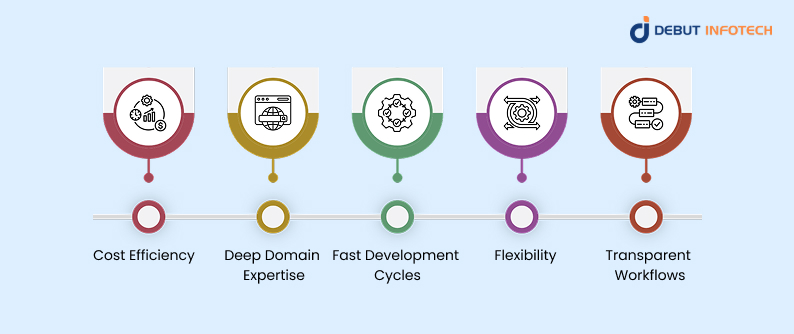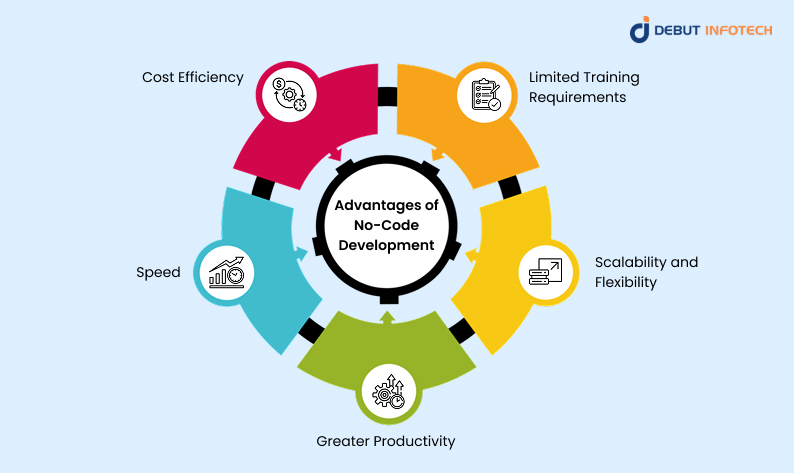Table of Contents
Home / Blog /
Is Hiring Dedicated Development Teams Still Vital in the No-Code Era?
May 1, 2025

May 1, 2025
Both the dedicated development team model and the no-code development approach have their place in software development. However, most people often try to make it seem like businesses have to choose one over the other.
In practice, both these software development approaches have unique advantages and disadvantages.
Read on to learn more about both no-code development and the dedicated team model. At the end of this article, you should know what both approaches entail, their advantages & limitations, and most importantly when to use the dedicated development team model and when to rely on no-code tools.
What is a Dedicated Development Team?
A dedicated development team is a group of software development professionals assembled specifically to help a client fulfill their development needs for a particular period. Essentially, a service provider like Debut Infotech Pvt Ltd sources and assembles these developers into a single team, manages them, and offers their services to companies or businesses seeking to build exceptional projects.
This talent sourcing approach is a collaboration model between the company and the development service provider. It’s like having an in-house development team, except this time, the organization doesn’t incur the extra HR, administrative, or tax costs associated with hiring these developers full-time. At the same time, the dedicated team works exclusively for the client as part of the organization — the best of both worlds.
There are several advantages to this talent sourcing model. Some of them are discussed below:
Advantages of Hiring a Dedicated Development Team

Partnering with AI development companies like Debut Infotech for dedicated development teams has the following advantages:
1. Cost Efficiency
Dedicated development teams are more cost-efficient because businesses don’t have to incur extra overhead or infrastructure costs. This is because the business doesn’t have to provide software licenses, office space, equipment, and other resources, as the team members will be working remotely.
Likewise, the service provider handles all recruitment and training resources. The business simply gets a team of seasoned professionals who’re ready to deliver.
2. Deep Domain Expertise
Expertise and specialization emerge through repetition, as a group of professionals in a dedicated development team works on multiple development projects within a specific niche over time.
So, when a business hires these professionals, they’re not coming in for ifs, buts, and maybes. They do absolutes! They know what works and how to get the best results with limited resources.
The fact that the agency they are attached to constantly recruits and retains the best talents also makes it easy for businesses to access top talent. They’re not restricted by location, so dedicated development teams often comprise the best talents from around the world.
3. Fast Development Cycles
This deep domain expertise in different verticals ultimately culminates in faster development cycles and quicker time-to-market.
Not only that.
The dedicated development model thrives on undivided attention. Each team focuses solely on a project agreed upon in a contract and dedicates its resources and attention to such projects at all times. Compared to in-house teams that may be burdened with additional organizational or routine tasks, dedicated development teams focus on singular projects.
To cap it all, dedicated development teams often have their project managers skilled at enforcing agile development practices throughout the project. These teams are lean, agile, and swift in their delivery.
4. Flexibility
What if new requirements emerge due to changing business needs?
Dedicated development teams are structured to be agile enough to accommodate team changes by adding new professionals. Because the dedicated development company has a ready Arsenal of developers, the business doesn’t have to spend time recruiting new talent.
Furthermore, the business has the freedom to choose developers that suit their specific project needs and even organizational culture. Once again, the dedicated development team model is built to be agile by nature. So, they’re ready to adjust as the project requires!
5. Transparent Workflows
While some of their attributes may make them appear like mercenaries who care only about the task at hand, dedicated development teams prioritize clear and efficient communication channels. Like I mentioned earlier, they’re essentially team members for the duration of the project. Consequently, they always keep the business informed throughout the development process.
Choose Between No-Code Development and the Dedicated Development Team Model
At Debut Infotech Pvt Ltd, we offer consultancy services to help you decide the right project approach.
What is No-Code Development?
No-code development is a software development approach that enables non-technical users to build functional software applications without writing code.
Instead of hard-coding all essential aspects of an application, no-code development utilizes drag-and-drop interfaces, visual workflows, and pre-built components & programming tools to construct software applications, workflows, and solutions.
With the help of these tools, line-of-business employees who understand business requirements and possess industry-specific knowledge (also known as citizen developers or business technologists) can build apps without requiring in-depth programming knowledge. Some of the most common things for these people to build include forms, websites, prototypes & MVPs,
It is basically a software development approach meant to help non-programmers with no coding skills develop software projects.
But, how is that possible?
You see, it’s not like there’s no coding involved at all. It’s just that the tools used in no-code development are already pre-built with lines of code. It allows users to design applications by simply arranging visual components, such as forms, lists, and outlines. In return, the tools handle the rest by converting the user’s visual idea to functional code, while handling the data involved with structured data models and pre-built connectors.
That would imply that businesses can avoid the “heavy costs” of hiring experienced developers or dedicated development teams, right?
Well, true to some extent.
However, it is a rather nuanced conversation, and we’ll examine both sides of the coin shortly by discussing some advantages and limitations of no-code development.
First, the positives:
Advantages of No-Code Development

The following are some obvious benefits of no-code development:
1. Cost Efficiency
No code development doesn’t require expert professionals with in-depth programming knowledge, thus reducing traditional software development costs. As such, businesses can leverage their current domestic staff to build and manage some applications, and thereby making it relatively cheaper for organizations of different sizes to acquire custom software.
2. Limited Training Requirements
With the help of no-code development, it is simpler and more scalable to build an app. Users simply need to possess some industry-specific expertise and experience and they can create full software development products. This is because the no-code development platforms handle the backend coding tasks, leaving users to focus on functionality and visual appeal.
3. Scalability and Flexibility
It is relatively easy and quick to put together small versions of software development applications. At the same time, it is relatively easy for these applications to scale up, accommodate more features, or even handle changing requirements.
Consequently, businesses may find it easy to modify and adapt to changing business requirements and specifications.
4. Greater Productivity
The ability of non-technical staff within an organization to quickly and sustainably develop applications that meet their needs is a clear marker of productivity. This reduces the overall reliance on IT teams and other technical staff. Furthermore, this also frees up the time and resources of these technical teams to build more important projects and handle bigger tasks.
5. Speed
A quicker time-to-market and relative ease of transforming creative project ideas into tangible products or Minimum Viable Products (MVPs) are another major upside to no-code development. As such, no-code development enables businesses to be more agile and better equipped to adapt to dynamic business requirements.
One could argue that employing dedicated development teams also guarantees these advantages, albeit in a slightly different fashion. Nonetheless, no-code development is a concept that most businesses (approximately 75%, according to projections made by Gartner Research in 2025) are now considering.
But what are they missing by opting for no-code development?
Let’s find out as we examine some limitations of no-code development.
Limitations of No-Code Development
The following are some potential business downsides of no-code development:
1. Limited Usability
Put simply, there are only so many software development projects that no-code development tools can help your business build. They’re capable enough to handle simple internal tools and workflows, prototypes, MVPs, and even some basic mobile apps. However, when it comes to building solid applications for major processes, you might need to bring in the big guns to handle such. No-code development is simply not capable of supporting projects that require complex data processing capabilities.
2. Unclear Record Keeping Procedures
Traditional software development practices often make clear provisions for keeping and organizing all data associated with the application development process. Likewise, the software development professionals with in-depth programming skills are often equipped with a deep understanding of the best practices required to handle this data properly.
The same can’t be said about no-code development, which affects the business in that users are unsure whether the no-code development tools provide a way to track the data used for their projects.
3. Application Integration and Customization Difficulties
We mentioned earlier that no-code development typically can’t handle the requirements of building projects with highly specific or complex needs. Limited customizations is one of the factors responsible for this. The fact that no-code development platforms provide pre-built components and templates for users to work with almost always means they’re limited to these templates and components.
Moreover, businesses may become confined to a specific no-code platform, making it difficult to integrate all aspects of their systems into a cohesive unit.
4. Shadow IT
Shadow IT refers to a situation in which certain parts of an organization utilize IT systems, devices, or services without involving trained IT professionals. The side effect of this is that it often leads to a lack of standardization, integration challenges, and potential security challenges in the business’s overall system.
You see, there is a proper way to approach software development practices. However, when non-technical users who’re not well-grounded in these development best practices handle software development projects, the organization runs the risk of creating data silos, inconsistent user experiences, and overall system disruptions.
5. Data Governance and Security Risks
Failure to maintain robust data governance and security protocols is also a direct implication of shadow IT. Non-technical users run the risk of becoming overly reliant on the ease of creating applications, potentially paying inadequate attention to data protection, compliance requirements, and access controls. Dedicated development teams, on the other hand, are less likely to fall into this trap.
Consequently, no-code development may lead to the exposure of sensitive information, data breaches, and regulatory violations due to these possible oversights.
What is the major takeaway from all these?
While no-code development provides a seemingly shorter path to building applications, the user’s lack of in-depth technical knowledge opens up the business to potentially damaging blind spots.
The solution?
There are simple situations where no-code development can suffice, and there are others where its simplicity should not prompt the business to substitute traditional software development with dedicated development teams.
Care to find out?
Skip to the next section.
When Should Businesses Use No-Code Development?
Your business should consider using no-code development if your project fits most of these criteria:
- You need to build simple or moderately complex applications: These could include straightforward workflows, basic data collection, or standard business processes that require minimal customization.
- You need to enter the market quickly: No-code development can save you weeks or months of development if you’re launching fast to test an idea or get early user feedback. In this case, you don’t need a polished product yet.
- You have a limited budget: No-code platforms often reduce upfront costs significantly compared to hiring developers.
- You want to empower non-technical team members: If product managers, marketers, or operations staff need to build or tweak apps without waiting on IT, no-code offers independence.
- You’re building internal tools or prototypes: For internal dashboards, simple CRMs, or MVPs, no-code is a quick, flexible solution.
- Your app doesn’t require complex integrations or custom APIs. If your solution primarily utilizes built-in platform features or standard third-party integrations, no-code solutions can handle it.
- Security and compliance requirements are minimal or standard. When your app doesn’t process sensitive data or require strict regulatory controls, no-code platforms’ default protections are often sufficient.
- You expect low to moderate user traffic and data volume: No-code tools are ideal for projects with predictable, smaller-scale usage.
When Should Businesses Prioritize Hiring a Dedicated Development Team?
On the other hand, you should opt for a dedicated development team if your project matches any of these scenarios:
- Your solution requires complex, custom functionality: If you need unique business logic, advanced algorithms, or features that no-code platforms can’t support, you should prioritize hiring a dedicated development team.
- Scalability is a critical concern. When you anticipate rapid growth in users, data, or transactions, a dedicated team can design and build a robust architecture that scales smoothly.
- You require deep integration with legacy systems or multiple APIs: Complex back-end connections often exceed the capabilities of no-code solutions and require developer expertise.
- Security, compliance, and data privacy are non-negotiable: For industries like finance, healthcare, or government, custom-built solutions ensure you meet strict standards.
- Your product is customer-facing and mission-critical: When your app represents your brand and directly impacts revenue or customer experience, quality and reliability are of paramount importance.
- You want full control over the technology stack and codebase: Dedicated teams allow you to customize, optimize, and maintain your product without platform limitations.
- Long-term maintenance and feature evolution are planned: If your product roadmap includes continuous improvements and scaling, a dedicated team provides ongoing support and development agility.
- You need a competitive edge through innovation: Custom development enables you to implement cutting-edge technologies and unique features that differentiate your business.
- Your project requires multi-platform support with native performance: For apps needing native mobile features or complex UI/UX, developers deliver superior results.
Leverage the Dedicated Development Team Model to Boost Your Bottom Line
Dedicated developers can bring specialized skills, focus, and faster delivery to your development projects.
Conclusion: Is Hiring a Dedicated Development Team Still Relevant in the No-Code Era?
Hell yes!
While new no-code tools are flooding the market daily, and the demand for no-code developers continues to rise, this doesn’t mean hiring a dedicated development team is a waste of resources.
However, businesses must recognize the situations that are appropriate for the dedicated development team model and those that are better suited for no-code development.
If you’re caught in the middle about this, ask yourself these questions:
- How complex is my app? Simple? Go no-code. Custom and complex? Get developers.
- How fast do I need to launch? ASAP? No-code wins. Quality over speed? Dedicated team.
- What’s my budget? Tight budget? No-code saves cash. Ready to invest long-term? Hire devs.
- Will my app need to scale big? Small scale? No-code works. Big growth ahead? Dev team required.
- How critical is security and compliance? Low risk? No-code’s fine. High stakes? Developers only.
Leaning towards the dedicated development team model?
You can hire the best dedicated development teams at Debut Infotech Pvt Ltd today!
Frequently Asked Questions (FAQs)
Because it democratizes app building and enables non-technical users to create solutions with lower costs and faster delivery, no-code development is a key component of the future software creation process. It won’t, however, completely replace knowledgeable developers who work on intricate, personalized projects.
No, there are no clear indications yet to show whether no-code platforms will completely replace developers. They empower non-technical users by automating fundamental procedures and simplifying the process of developing simple apps. Nonetheless, the proficiency of professional developers remains necessary for developing complicated, scalable, and customized software. A hybrid strategy is the way of the future, where no-code enhances rather than replaces developers.
Due to the rise of no-code tools and a worldwide shortage of qualified software engineers, companies are looking for quicker and less expensive ways to create applications, which has increased demand for no-code developers. This demand is fueled by the thriving no-code market, which is expected to grow significantly by 2030, empowering citizen developers and facilitating rapid digital transformation.
AI will improve no-code development by making no-code tools quicker, more adaptable, and easier to use, rather than replacing it. The majority of tech executives envision a hybrid future in which AI increases no-code efficiency without making it obsolete.
Coding will not go out of style. Human developers are still necessary for complex problem-solving, creative design, quality assurance, security, and technology adaptation, even though automation and artificial intelligence will help and even generate code on their own. Coding will evolve, not disappear.
Talk With Our Expert
USA
2102 Linden LN, Palatine, IL 60067
+1-708-515-4004
info@debutinfotech.com
UK
Debut Infotech Pvt Ltd
7 Pound Close, Yarnton, Oxfordshire, OX51QG
+44-770-304-0079
info@debutinfotech.com
Canada
Debut Infotech Pvt Ltd
326 Parkvale Drive, Kitchener, ON N2R1Y7
+1-708-515-4004
info@debutinfotech.com
INDIA
Debut Infotech Pvt Ltd
Sector 101-A, Plot No: I-42, IT City Rd, JLPL Industrial Area, Mohali, PB 140306
9888402396
info@debutinfotech.com




Leave a Comment